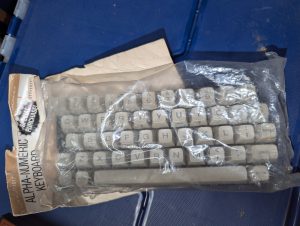
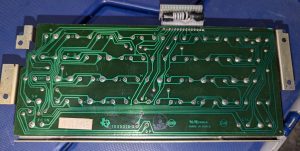
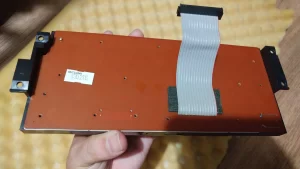
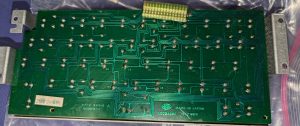
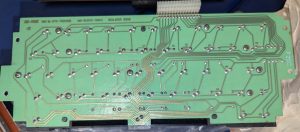
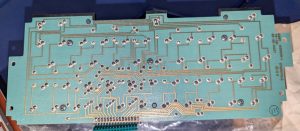

Enter the TI-GROMmy, a modern replacement board for the system GROMs of a TI-99/4A. It is flash programmable from the 99/4a and can contain multiple grom binaries and plug into your console directly in the grom sockets.
Uses STM32G070KB6 MCU.
Installation
The grommy2 boards are shipped preprogrammed.
For installation, please refer to the pictures in the presentation.
the process is simple: remove all three system GROM chips, and plug the grommy2 board in their place.
The pictures show installation to the two leftmost GROM sockets. That’s how I have also installed the boards.
However, since the GROM chip sockets share all pins, it is also possible to plug the board into the two rightmost sockets. The only reason why this would make sense is if the contacts are somehow bad on the two leftmost sockets, or they are damaged or something like that.
After installation, and make sure all pins on the bottom side are in the socket and the alignment is good. I always look from the side to make sure that’s the case, see the circled area in the picture below.
Power on the console. It should boot up normally. The red LED will be lit when the grommy2 is active. During normal boot with default console GROM code the LED will be lit almost all the time, since the console is executing GPL code from GROMs almost all the time.

Option switches
If you want to install switches to select options, please refer to the page 4 of the presentation. It shows two signals of interest. All signals mentioned below are available on the side connector of the grommy2, the right angle pin header pictured above.
Banking hardware selection
Please refer to page 5 of the presentation. This is optional.
Programming the grommy2
Please see https://github.com/Speccery/StrangeCart-Doc/blob/main/grommy2/README.md
For example GPL code, please see https://github.com/Speccery/1bpp2basic/blob/main/config.gpl . This is the source code for the grommy2 configuration utility.
The TI-99/4A is the first microcomputer with the Plato educational system first by a cartridge based interpreter with disk based lessons and later with a rs232 based Plato terminal program that connected to the main Plato system via modem.
This modem based terminal was never really available to the public so was basically forgotten about in the TI-99 community.
Then in recent years Thomas Cherryhomes set up a Plato environment and has made it a priority to revive the micro computer terminals for many systems. He got ahold of the original terminal software and posted on the Atariage TI-99/4A forum looking for help testing the original terminal software. I downloaded a copy from him and was able to test it connecting to his irata.online Plato server with a wifi modem. There were some incompatibilities with the terminal and irata so Thomas decided to rewrite the terminal in C using the newly created GCC port for TMS9900 development. He was able to get it together but when testing found that the TI-99/4A rs232 port was unable to handle the data rate requirements so he decided to make the terminal use the telnet protocol over the TIPI device designed and built by Matthew Splett. You can download and use this terminal with an expanded 99-4A with 32k RAM expansion and TIPI
You can connect to https://irata.online ‘s Plato system from your TI-99/4a with TIPI installed with this command: CALL TIPI(“PI.HTTP://TI99.IRATA.ONLINE/PLATO”)
You can connect to https://www.cyber1.org/ ‘s Plato system from your TI-99/4A with TIPI installed with this command: CALL TIPI(“PI.HTTP://ftp.whtech.com/TIPI/PLATOC”)
Note: For those without TIPI hardware, the Classic99 Emulator supports the TIPI networking stack and will work with this, just run the commands above in basic and you will be using Plato in no time.
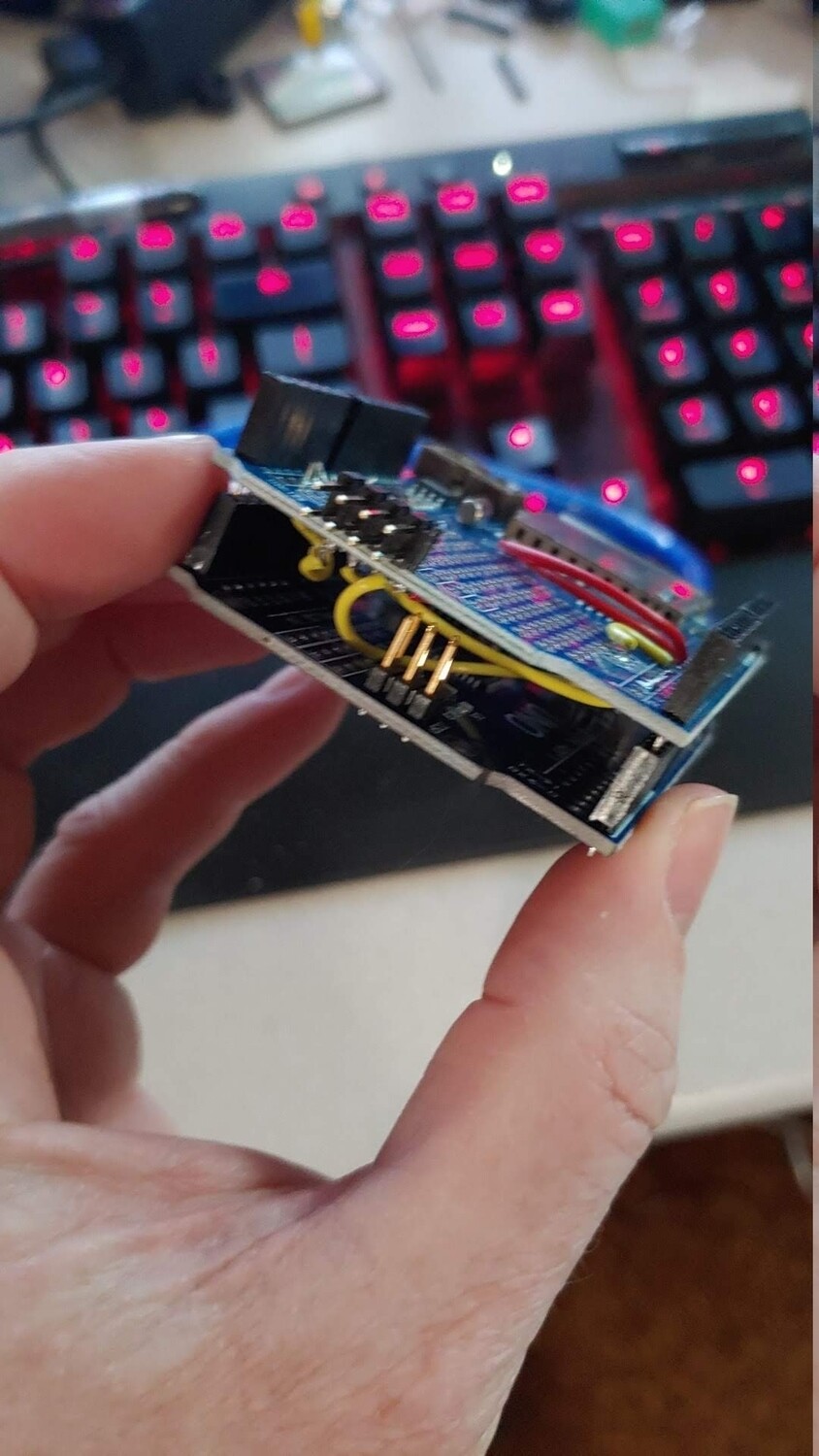
This is a HEXBUS emulation running on an Arduino Uno board with add-on clock/sdcard board.
Usage:
Power on HEXTIr
Connect HEXBUS cable (key points up on devices made by arcadeshopper.com)
Power on CC-40
You should see an activity light on the HEXTIr board blink when the CC-40 handshakes.
Catalog:
Loading programs:
Software repo: https://github.com/go4retro/HEXTIr
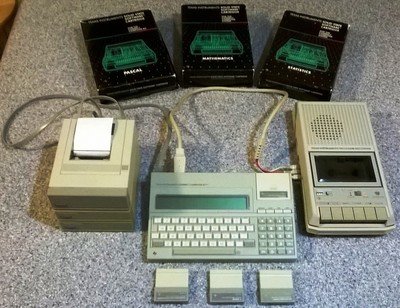
FAQ for CC40
[catlist name="CC-40 FAQ"]
Archiver 3.03, often abbreviated as Arc303, is the TI’s equivalent of ZIP files they are compressed files that usually contain more than one other files inside them.
Usually these end with an ‘@’ character to indicate they are archived, although some PC distributions may use a .ARC or .ARK extension instead. To extract the files, you will need a copy of Archiver 3.03 found at http://ftp.whtech.com
https://www.mocagh.org/loadpage.php?getcompany=ai&npp=25&whatsnew=0&start=0&series=TI-99%2F4A+Adventures+Series has a nice list of the games available for this cartridge. You need a cassette player/cable or disk system to load the games with the adventure module. No other expansion is required it works fine on stock console.
Adventure Games:
Others listed: https://intfiction.org/t/list-of-games-in-scott-adams-ti-99-4a-format/49771
This game is unique as it was only created for the TI-99/4A (officially adventure #14) and it is the first graphical adventure game published for home computers.
Infocom officially released the following games for the TI-99/4A
The TI community has released an updated interpreter that supports all of the original games plus additional
A recent infocom compatible release was made that includes a TI-99/4A release
Hybernated – 1 https://atariage.com/forums/topic/321529-for-fans-of-old-infocom-games-something-new/
Abrreviations. By Dan H. Eicher <Eicher@Delphi.com> AVPC - Advanced Video Display Processor, produced by Digit Systems (Tom Spilane) - This PBOX card use an 9938. c - Small C by Clint Pulley for the 99/4a. E/A - Editor Assembler. FDC - Floppy Disk Controller. FWEB - Funnel Web. GRAMULATOR - Graphics Ram Module produced by Cadd Electronics allows the user to load/modify and run cartridges. Unlike the GramKracker produced by Millers Graphics with modifications, this unit could also run MBX modules. GRAM KRACKER - See Gramulator. Grand Ram - A ramdisk produced by DataBiotics. Unique in that it both battery backed up like a Horizon Ramdisk and provided print spooler software (like the Myarc 512K) card. It also included connectors on board to connect to emulate the PBOX bus and cartridge port. GROM - Graphic ROM Rom Memory developed by TI that automatically increments. HFDC - Myarc Hard Floppy Disk Controller. MBP - Eight port analog to digital card with real time clock. MBX - Milton Bradley Expansion Unit (yes the toy maker) allowed the 99/4a to use voice directed games. PBOX - Peripheral Expansion Box also known as PEB. PC99 - A software package for MSDOS PC's (486-50 or faster) that emulate a TI99/4A. This is commercial software and well supported. PGRAM - Like the GramKracker, but on a PBOX card. PIO - Parrallel/Printer Port. POP-CART - Cartridge produced by OPA that up to 512K of grom code and any number of cartridges could be placed. SOB - Son Of a Board. This board also plugs into the console, in the GROM1 socket. It adds an enhanced menu upon power up and fixes some video initialization problems that are transparent, unless you are using a 9938 or 9958 video controller chip in your system. TIM - TI Image Maker. This is a an 80-column board produced by OPA. It had a Yamaha 9958 chip and came bundled with the SOB. It mounts inside the TI console in the TMS9918 socket. V9t9 - A software package for MSDOS PC's (386-25 or faster) that emulates a TI99/4A. This is freeware (produced by Ed. Swartz) and no support from the author is available, but the source code is. XB - Extended Basic.
Many Sidecar Expansions were made for the TI-99/4A:

Homebrew Sidecars
The power supply is a very standard setup, and could be replaced by any standard PC power supply. |
|
The DC voltages out are:Pin 1 = -5 volt Pin 2 = +12 volt Pin 3 = GND Pin 4 = +5 volt. |
|
TI was required by the UL to add a fuse to the external power supply. Their solution? add a pigtail to the power cord with the fuse in a little plastic box.
These fuses tend to blow after so many years of use, so the fuse needs to be replaced or just remove the pigtail if you are using a power strip with built in circuit breaker making the fuse unnecessary. You will find it’s just stuck on the old plug with some adhesive and it should come apart with some effort.
Fuse type: 4/10A 250V
Schematic for power supply (not QI)
Here is an interesting project replacing the console power supplies with a new board: